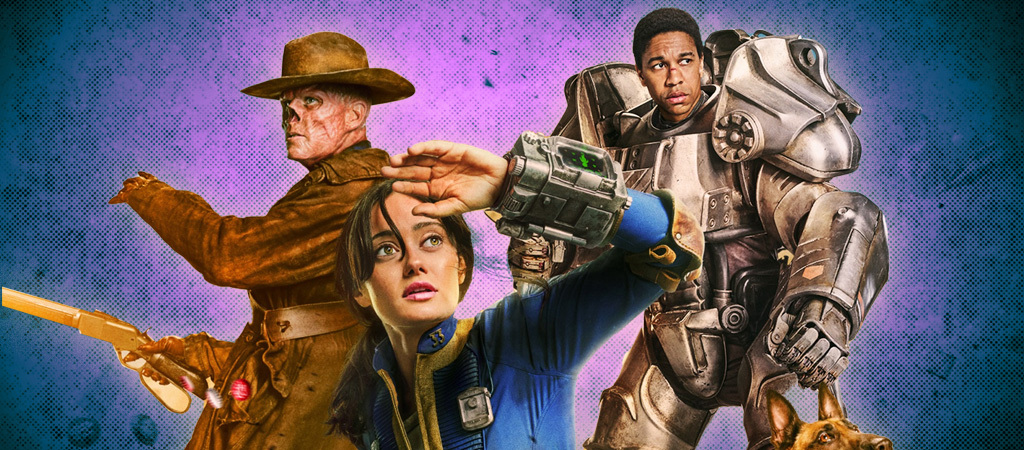
Mass extinction is just the beginning for Amazon Prime Video’s latest streaming entry, Fallout. It’s here, at the beginning of this largely spoiler-free review, that we’re obligated to explain the darkly funny, post-apocalyptic satire’s video game origins even though knowledge of said origins is absolutely not a prerequisite for enjoyment.
Yes, Fallout is an adaptation of Bethesda’s behemoth franchise, a story set within the retro-futuristic world that’s captivated console users for years and years. Yes, there are delightful little nods to in-game storylines – Pip-Boys and Nuka-Cola and Radaway, but they either serve a larger purpose or don’t linger for too long, ensuring that the show, produced by Westworld creators Lisa Joy and Jonathan Nolan, stands on its own two feet. Long-time gamers should have little to gripe about while those craving better genre fare amidst the streaming glut should come away satisfied. Whether you know its history or not, Fallout is a fucking blast of a sci-fi show that defies expectations in the most unconventional of ways.
Its quick time jump establishes the setting of this garish, goofy tale. Hundreds of years after nuclear war laid waste to much of the world, survivors exist on a blighted stretch of the California coast known, naturally, as the Wasteland. To replicate some of the freedom offered by the RPG source material, Fallout introduces three protagonists pretty early on. Lucy (Ella Purnell) is a Vault-dweller, a naïve-yet-ambitious young woman sheltered in an underground ecosystem reserved for the privileged few. Her 1950s Americana cliche-riddled peachy-keen existence is admittedly strange – when sparsely-populated survival communes are so close-knit, fooling around with your cousin is all hunky dory, as is blindly marrying a stranger from the next vault over. When tragedy strikes, Lucy decides to brave the radioactive wilds topside on a rescue mission that puts her on a collision course with some strange characters.
Enter, the Ghoul. A barely-recognizable Walton Goggins sans schnoz, the Ghoul is a mutated gunslinger, revived and experimented on over the centuries by anonymous caretakers whose goal – we can only guess – was to create the most disfigured Clint Eastwood stand-in the television world has ever seen. A gruff badass of few words, the Ghoul is fueled by a backstory filled with a lot of pain and loss. Hurt people hurt people, right? Like Lucy, he’s on a reconnaissance mission that’ll eventually force the pair to form a sort of alliance that’s codified in a stand-out 4th episode.
Lucy and the Ghoul are interrupted at multiple turns by Maximus (Aaron Mohen), a surface-dweller who belongs to an ultra-militaristic sect known as the Brotherhood of Steel. Boasting armor-powered knights and a mission statement that seems to center on preserving relics of the past, he lies, cheats, and steals his way to a promotion he doesn’t deserve. The only way to keep it? Return the same world-changing artifact both the Ghoul and Lucy are searching for.
It feels trite to say that Fallout is, at its heart, a character study. What recent video game adaption, from Paramount+’s Halo to HBO’s The Last of Us, doesn’t claim the same? But even amongst the more surreal moments, from Matt Berry dubbing an organ-harvesting robot to exploding heads and slo-mo massacres set to Johnny Cash tunes, it’s the motivations of the main trio that translate as the show’s most interesting element. Lucy’s slow descent into cynicism bulldozes the foundational “Golden Rule” most societies are built on. The Ghoul’s tragic past is used as more than just character exposition for why he’s so hardened in the present – and why Lucy’s continued presence in his quest is both troubling and transformative for him. And Mohen’s Maximus is a walking contradiction – cowardly yet boasting moral conviction, incompetent but oddly adaptable, meek yet opportunistic. He’s fascinating and frustrating in equal measure, and, along with Purnell, he does most of the comedic lifting in the first half of the series.
What’s most addictive about Fallout is how it spins its many yarns, threading them together long after you’ve written off a particular storyline or character. Goggins’ Cooper Howard – a pretend cowboy for hire in those pre-war days who lived an idyllic life on movie sets – pops up unexpectedly later in the season as the show gifts entire episodes that answer lingering questions about Vault-tech and its real mission statement. The bunch of brainless sardines living in a tin can beneath the surface aren’t just twiddling their thumbs. Even an early-established antagonist to Mohen’s Maximus, a B-character who could’ve easily dropped off after episode one is given a worthwhile arc that challenges the boy he once bullied. Fallout never loses the forest for the trees, but that doesn’t mean lingering on them is a waste of time. Despite what the Ghoul says, getting “sidetracked by bullshit” is half the fun here.
Ultimately, Fallout is a fascinating blend of aesthetics – an Atompunk adventure that marries Rockwellian sensibilities with eerily immediate dilemmas. A story of haves and have-nots, it manages to tread new ground within a genre that’s been covered almost too extensively thus far, mining comedy from its most mundane horror elements. (Don’t be surprised when a hacksaw beheading and a hazing gone monstrously wrong tease out a laugh or two.) To call it weird would be an understatement, one that doesn’t do justice to how bizarrely fun binge-watching it is. Finally, TV has given us a post-apocalypse that doesn’t take itself so fucking seriously.
All eight episodes of Fallout stream on Amazon Prime Video on April 9th.
